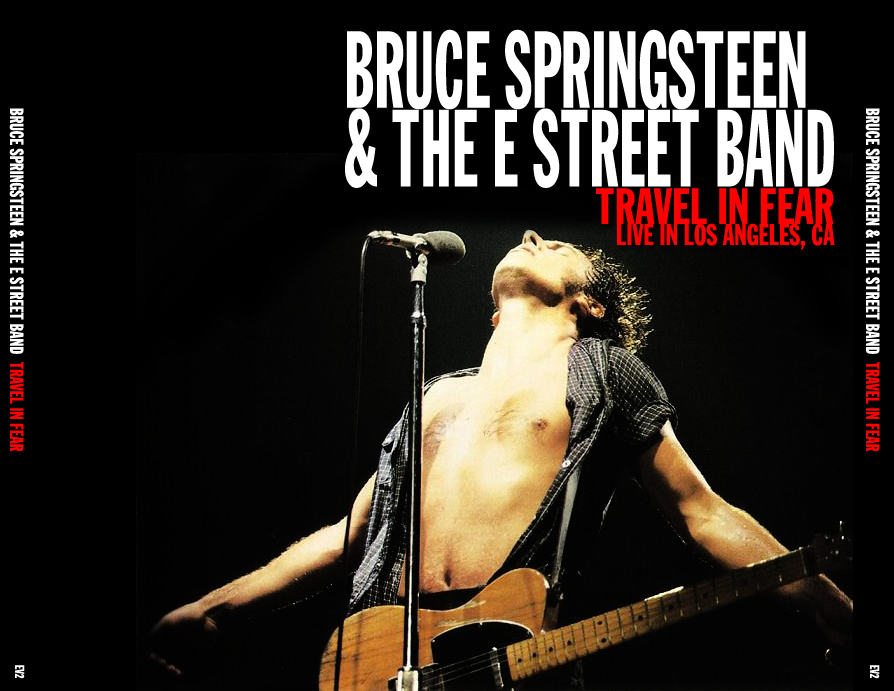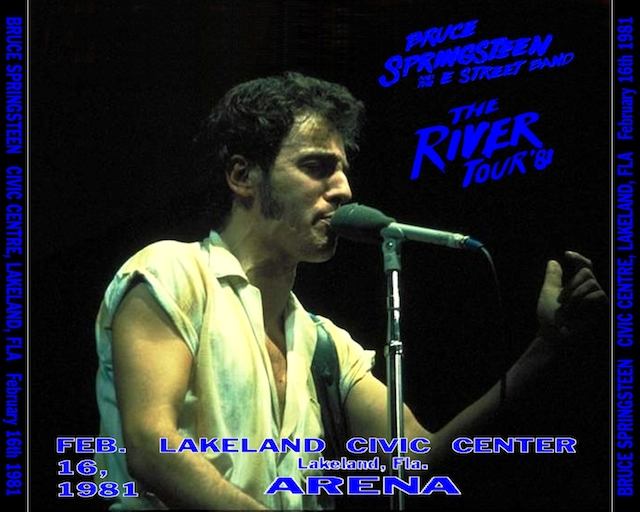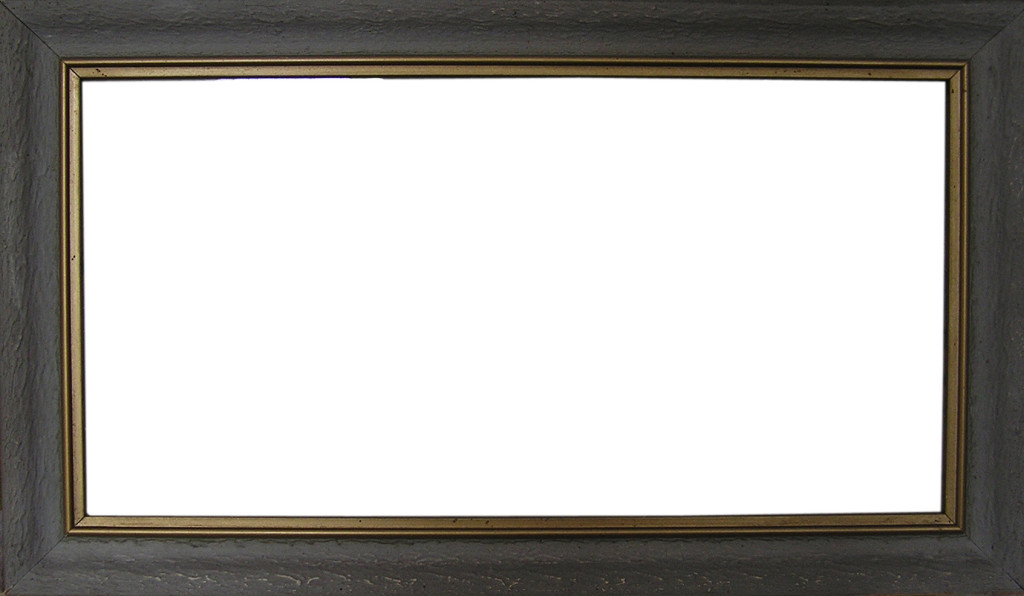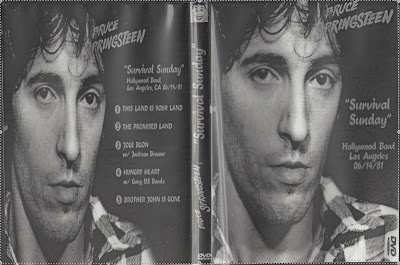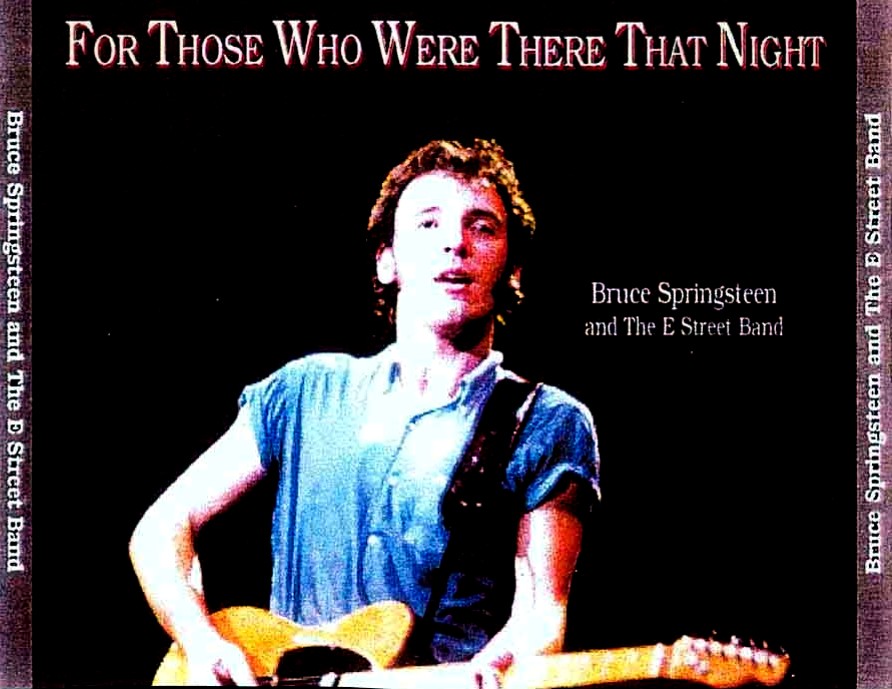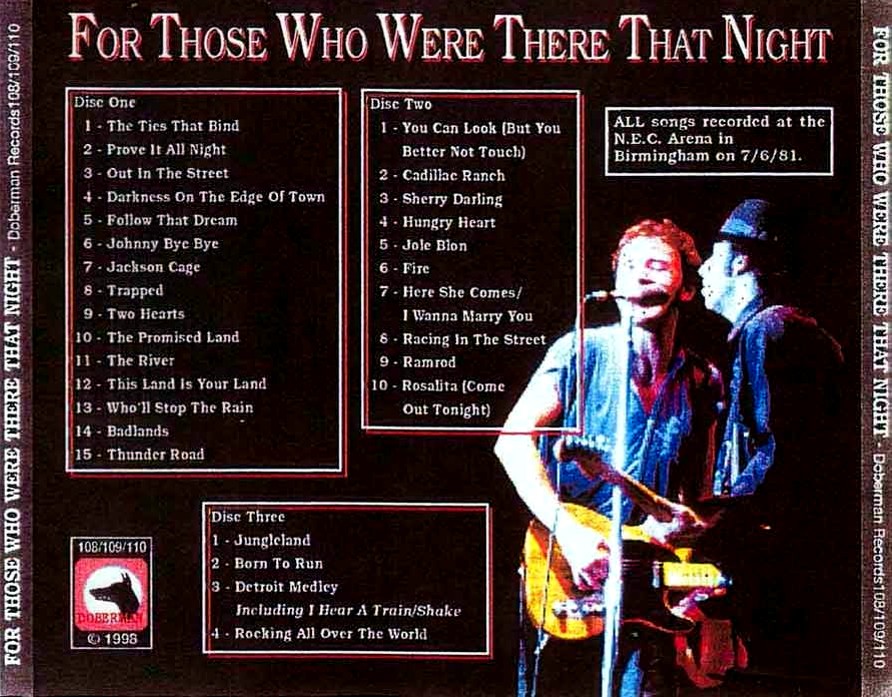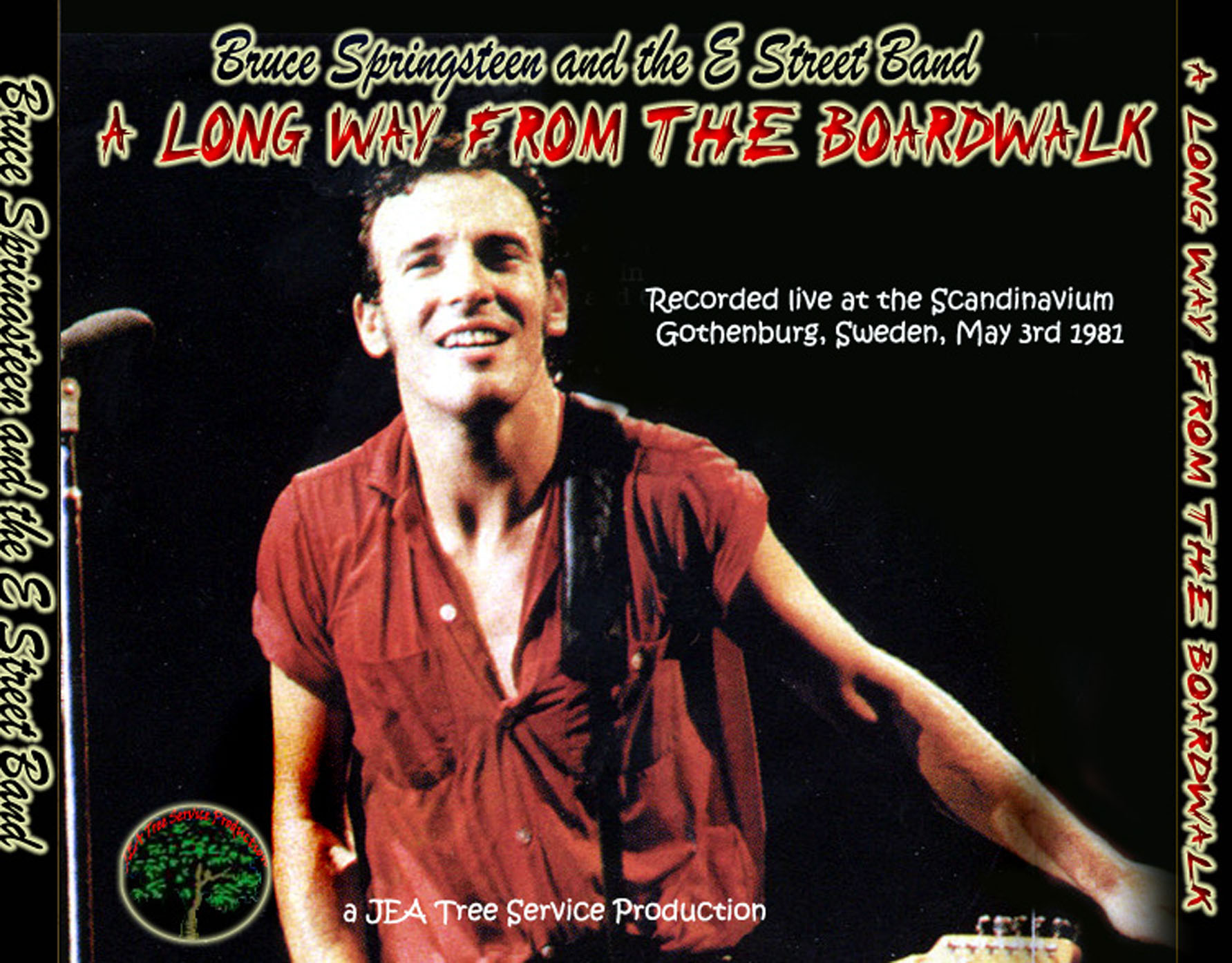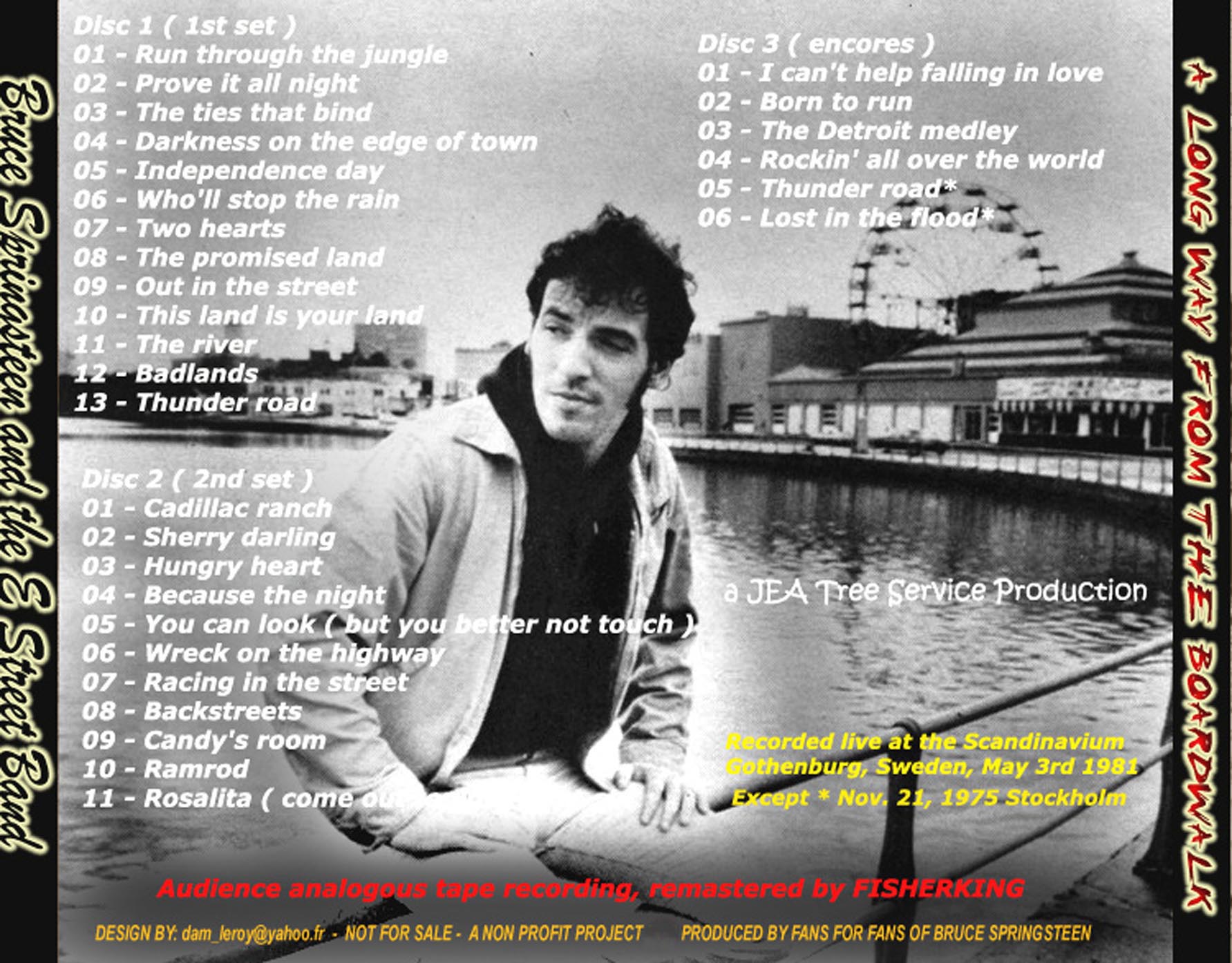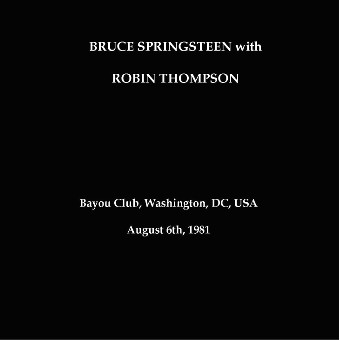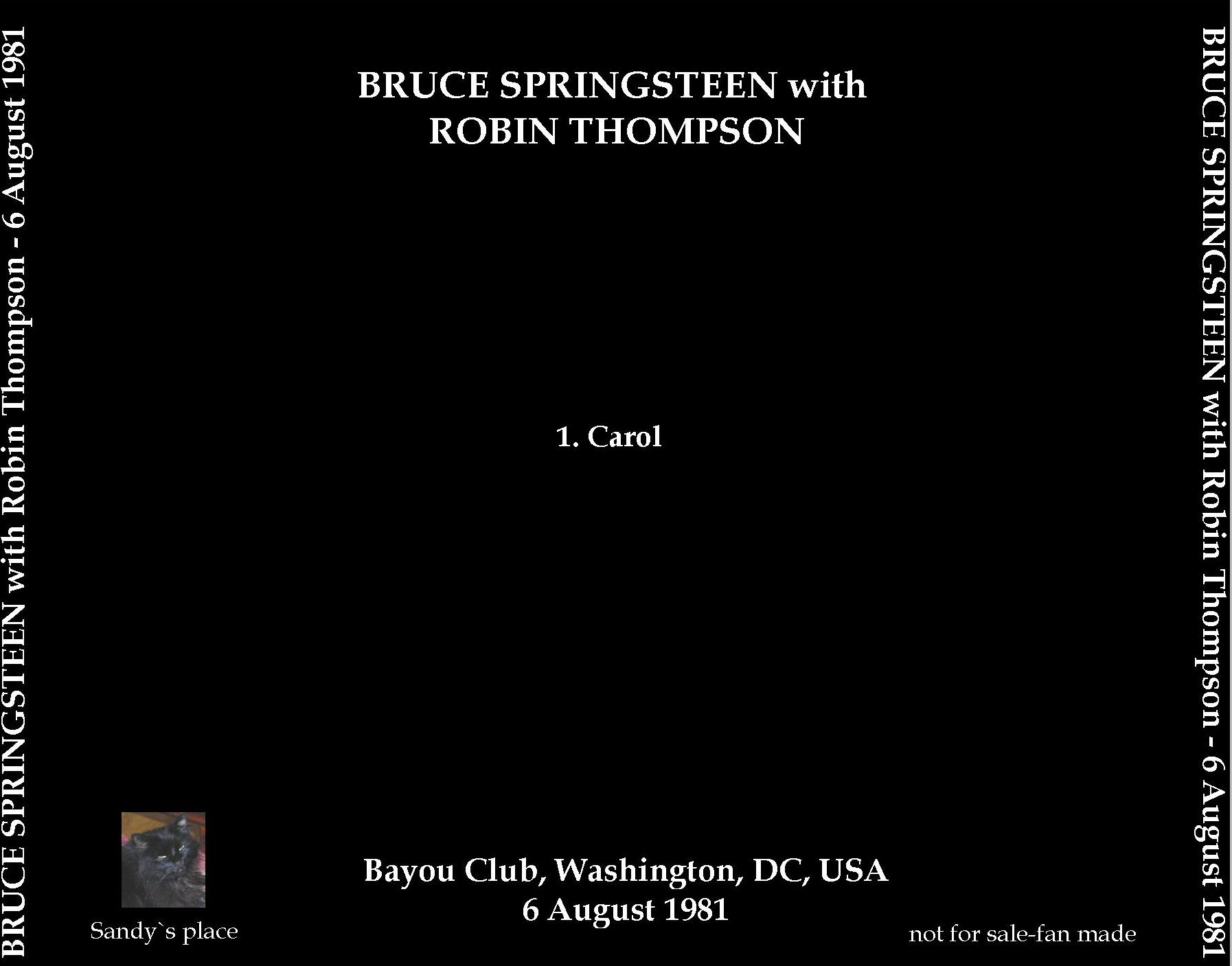Articolo ovviamente su Bruce Springsteen tratto dal numero di Musician del febbraio 1981 che spero sia gradito.
Commentate! Commentate!
Lo ho diviso in due parti causa lunghezza.
Buona lettura
Bruce Springsteen
Springsteen returns from his two year marathon in the studio and introduces some new characters and insights along with some older influences, roaring to life the cylinders of his instinctive sense of emotional event. Dave Marsh examines the view from inside then of the last Roadside Romantic. by Dave Marsh
A year ago, taking a respite from recording to play two nights of the MUSE anti- nuclear benefit concerts, Bruce Springsteen pared his normal three hour show down to a more everyday 90 minutes. The result was pandemonium just this side of Beatlemania. Following the biggest stars in American soft rock to the Madison Square Garden stage, Springsteen and the E Street Band upstaged everyone, including the issue itself. The air in the hall that night was one of fanaticism and conversion, as though Springsteen were a rock and roll evangelist and the Garden his tabernacle.
It’s easy to imagine that Springsteen was just a pro rising to an occasion which included a camera crew and a recording truck, not to mention a backstage full of peers. What’s harder to explain, unless you’ve seen him onstage before a crowd that might not include so much as a weekly newspaper reviewer, is that the MUSE shows were just a fragment of what he usually does. “After those shows went over so great, I just figured that that’s what we’d do on this tour,” remembers E Street guitarist Steve Van Zandt, “Just 90 minutes, a couple of ballads, and make the people as crazy as you can, like the old days. We can do that. But not Bruce. What we ended up doing was just adding that 90 minutes to the show we always do.”
By late October, when the E Streeters hit LA for four shows at the 15,000 seat Sports Arena, they were playing four and one half hour shows, five nights a week. Going on at 8:30, they’d break at 10, and return a half hour later and play until 12:45- or 1:00 or 1:15. And they weren”t playing the ebb-and-flow show offered by most bands who play so long. We’re talking about four hours of ensemble rock and roll here, in which even the ballads are attacked more strenuously than most modal jams. Yet Jon Landau, his manager, said one night, “I think Bruce might actually play longer, except that the band just gets worn out.” True enough, drummer Max Weinberg often spends intermission taping bleeding fingers, and the others are spared such medicaments only because their instruments are less physically demanding.
Generally, Springsteen did 32 or 33 songs, including 17 or 18 from The River, a half dozen from Darkness on the Edge of Town, five from Born to Run, the perennial set closer “Rosalita” from The Wild, The Innocent and the E Street Shuffle, plus “Fire” and “Because the Night” from his seemingly bottomless supply of unrecorded hits.
And, of course, the Mitch Ryder medley which was the highlight of the No Nukes LP.
But the show has that shape only on nights when Springsteen hasn’t declared a special occasion, which is a rare night in itself. On Halloween, the second night in L.A., he cooked up a version of “Haunted House,” the old Jumpin’ Gene Simmons hit, at soundcheck, and opened the set with it—after appearing from a coffin, and being chased around the stage by ghoul-robed roadies during the guitar break.
On Saturday, Bruce added an acoustic guitar and accordion version of “The Price You Pay,” and debuted “Fade Away,” the one song from The River he’d avoided. On Monday night, with Bob Dylan in the house for a second night (he’d come with Jim Keltner on Thursday, and been impressed), Springsteen put “The Price You Pay” back in and dedicated it to his “inspiration.” Plus a lengthy version of “Growing Up,” from his first album. On both nights, he ended the encores with Jackson Browne, dueting on “Sweet Little Sixteen.” On neither night did the inclusion of the additional songs mean the removal of any of the others.
“Yeah, but you really missed it in St. Paul,” said Van Zandt. “He turned around and called ‘Midnight Hour,’ and we all just about fainted. Funky (bassist Garry Tallent) didn’t even believe we were doing it until about the second chorus.” The band had not rehearsed the song, and it’s unlikely that the E Street Band’s present lineup had ever played it before in its five years together. But even the musicians thought that it sounded great.
The expansiveness and elasticity of Springsteen’s show is a conundrum, because arena rock is in all other hands the surest route to formula. One of the most miserable summers of my existence was spent watching 15 Rolling Stones shows in 1975. By the fifth, I was fighting to stay awake; by the tenth I’d stopped fighting, a circumstance I ascribed to the band’s . senility until it occurred to me that no one was meant to look at more than one or maybe two of their damn fiestas.
That’s rock and roll for tourists. Springsteen plays for the natives. Although he would probably put it more idealistically, he’s really just never lost the consciousness of a bar band musician, who knows that a good part of the house may be seeing all three sets. And like a bar band veteran, he refuses to resort to gimmicks. Mark Brickman’s lighting is the best in rock, but it’s based on relatively simple theatrical gels and an authoritative sense of timing with follow spots; any funk band in the Midwest might have a more elaborate concept, but nobody with lasers achieves such an effective result. (Brickman has a computer along on this tour, but only, he told me, because “if you can figure out a way to program Bruce’s show, you can figure a way to make it work for anything.” Most nights, Brickman and soundman Bruce Jackson might as well throw their set lists away.)
But what reveals Springsteen bar band roots more than anything is his sense of intimacy with the crowd. One night during this tour, someone told me, he actually announced from the stage, “If the guy I met at the airport yesterday is here, please come to the stage at the break. I’ve got something for you,” which is about as close to sock hop mentality as you could ask. At his show in Phoenix, during “Rosalita,” Bruce made one of his patented leaps to the speakers at the side of the stage. But this time
he missed.
The crowd just kept on cheering, but back at the soundboard where Jackson and I were sitting, the tension was thick. Bruce might do anything, but this was weird; the band was holding the chord, and the chords of “Rosalita” are not meant to be held for five seconds, much less fifteen.
It’s a good long drop from the speakers, two feet high, to the floor, a good eight or nine feet away. All there was between Bruce and the hard concrete floor was the band’s monitor mixing board, but as he tumbled down, roadie Bob Werner reached out and broke the fall. (He sprained his wrist in the process.)
Neither the band nor the crowd could see any of this. The next thing any of us knew, the guitar appeared, tossed atop the speakers. Then a pair of hands and at last, Springsteen’s head, with his silly-faced-little-boy grin. He shook his head, pulled himself the rest of the way up, and strapped on his guitar, went back into action as if nothing had occurred.
This moment is presumably on film—there was a crew shooting a commercial that night—though from what angle I cannot say. But what that incident proclaims, more than anything, even Bruce’s sense of spontaneity, is his sense of event. The cardinal rule of his shows is that something always happens. It’s not only, as he says in the interview below, that he’s prepared for whatever happens. Somehow, he always makes sure that something does occur. I’ve seen at least 100 shows in the past six or seven years. The worst of them was fascinating, but maybe the most awesome have been the times when, after four or five nights of hell raising action, he manages to make it different again. This guy does not know the meaning of anticlimax.
“The moment you begin to depend on audience reaction, you’re doing the wrong thing. You can’t allow yourself,
no matter what, to depend on them.”
But there’s the bright side. There are darker ones. In Los Angeles, where ticket scalping is legal, front row seats for this extravaganza were going for $180, $200, $250. And fans wrote Bruce to complain, not just that tickets were being scalped, but that the best ones were. It’s an old story, and most bands would let it slide, but Bruce took a stand. Each night in L.A., he gave the crowd the name of a state legislator, and a radio station, who’d agreed to campaign to change the scalping law in California. This might qualify as a gesture—although the night after Landau got a pre-show phone call from a “ticket agent” suggesting that Bruce “do what he does, and I’ll do what I do, so why don’t he just lay off,” he made the announcement three times—but he’s also hired investigators to get to the bottom of the mess, with intentions of turning the information over to the proper authorities, if any hard evidence can be turned up.
And this reflects the spirit in which Springsteen played M.U.S.E. Although he was one
of only two musicians at the benefit who did not make a political statement in the concert program (the other was Tom Petty), Springsteen upstaged the issue only accidentally. He felt that particular problem to his marrow; “Roulette,” the song he wrote right after Three Mile Island, is the scariest piece of music he’s ever done, for my money more frightening that even the last lines of “Stolen Car,” and unmistakably based on the event. (Not to mention Del Shannon’s paranoiac “Stranger in Town.”) There is more to come.
The River itself feels like a farewell to innocence. As Springsteen notes in the interview below, the innocent characters on this album are anachronisms. Their time is-gone. That guy Iying by the side of the road in “Wreck on the Highway” is not only the guy in “Cadillac Ranch” and “Ramrod,” he is also Spanish Johnny, the original man-child hero of The Wild, the Innocent and The E Street Shuffle.
The River is, I think, Bruce Springsteen’s best album for this very reason. It sums up seven years of work, and it does not shy away from the errors of his career thus far, nor does it disown them. He remains a romantic and a bit of a juvenile, after all this, for who but a romantic juvenile could conceive of a purposeless car thief as a genuine figure of tragedy? But he is also capable now of tying together his hopes and fears— the most joyous of songs are awash with brutal undercurrents.
The River wasn’t the record anyone would have predicted Bruce Springsteen would make. Epics aren’t anticipated (although they might be the subject of certain fervent hopes.) But if The River was unpredictable, the album that will follow it is almost unimaginable. And not only because the society that shaped Springsteen’s most beloved characters and the musical tradition he cherishes is now crumbling.
Among other things, The River is a Number One record. “Hungry Heart” looks likely to be his first Top Ten single. Things change when that happens, and we have not yet seen the rock and roller who is strong enough to withstand those changes. It would be naive to expect Bruce Springsteen to be any different.
Yet Bruce Springsteen’s career is all about naive faith. Who else could have survived The New Dylan, The Future of Rock and Roll, The Hype, The Boss? And emerged not only successful, but respected. It’s easy to play cynical rock journalist and suppose the worst—no one else has exactly cruised through success—but the fact is, Bruce Springsteen is the only human I have ever met who cannot sell out. He doesn’t have a price, because the things he wants are quite literally beyond price. You don’t have to believe me. Just wait and see. As Miami Steve says, “For the first time, I can really imagine rock and roll at 40.”
The interview below took place at the Fiesta Motel in Tempe, Arizona on Nov. 6th, from about 3:30 AM until dawn.
(The time frame is typical.) Bruce had just completed a show at Arizona State University, and in a strange way, what I’ll remember about that night isn’t talking with him or even the fall off the speakers but the lines he sang just after the fall, that climactic verse of “Rosalita:”
Tell your daddy this is his last chance If he wants his daughter to have some fun Because my brand new record, Rosie
Just came in at Number one
He won’t forget, either.
MUSICIAN: Here you are, The River is a Number One album, the single is a hit, you’re playing great shows in the biggest halls, and selling them out. In a sense, a lot of goals you must have had are now achieved. What goals are left?
SPRINGSTEEN: Doing it is the goal. It’s not to play some big place, or for a record to be Number One. Doing it is the end— not the means. That’s the point. So the point is: What’s next? Some more of this.
But bigness—that is no end. That as an end, is meaningless, essentially. It’s good, ’cause you can reach a lotta people, and that’s the idea. The idea was just to go out and to reach people. And after tonight, you go out and you reach more people, and then the night after that, you do that again.
MUSICIAN: One of the things that The River and also the show, its length and certain of the things you say between songs, are about is seeing more possibilities, more opportunities for things to do.
SPRINGSTEEN: Yeah. There’s an immense amount, and I’m just starting to get some idea about what I want to do. Because we’ve been in a situation, always, until recently, there’s been a lot of instability in everybody’s life. The band’s and mine. It dates back to the very beginning, from the bars on up to even after we were successful. Then there was the lawsuit.
And then there’s the way we work, which is: We’re slow. And in the studio, I’m slow. I take a long time. That means you spend a lotta money in the studio. Not only do you spend a lotta money, you don’t make any money, because you’re out of the stream of things. It’s like you can never get ahead, because as soon as you get ahead, you stop for two years and you go back to where you were.
MUSICIAN: Is that slowness as frustrating for you as it i;, for everybody else?
SPRINGSTEEN: I’m lucky, because I’m in there, I’m seeing it every step of the way. I would assume that if you didn’t know what was going on, and you cared about it, it would be frustrating. With me, it was not frustrating.
You know, we started to work [on the album] and I had a certain idea at the beginning. And at the end, that was the idea that came out on the record. It took a very long time, all the coloring and stuff, there was a lot of decisions and songs to be written. Right up until the very last two weeks, when I rewrote the last two verses to “Point Blank.” “Drive All Night” was done just the week before that. Those songs
didn’t exist, in the form that they’re on the record, until the last few weeks we were in the studio. So there’s stuff happening all the time. But we get into that little bit of a cycle, which hopefully we’ll be able to break—maybe, I don’t know.
MUSICIAN: In a lot of ways, The River feels like the end of a
“All the characters, they’re part of the past, they’re part of the future and they’re part of the present. And I guess in “Ramrod” there was a certain frightening aspect to seeing one that wasn’t part of the future. “
cycle. Certain ideas that began with the second and third albums have matured, and a lot of the contrasts and contradictions have been — not resolved — but they’ve been heightened .
SPRINGSTEEN: On this album, I just said, “I don’t understand all these things. I don’t see where all these things fit. I don’t see how all these things can work together.” It was because I was always focusing in on some small thing; when I stepped back, they made a sense of their own. It was just a situation of living with all those contradictions. And that’s what happens. There’s never any resolution. You have moments of clarity, things become clear to you that you didn’t understand before. But there’s never any making ends meet or finding any time of longstanding peace of mind about something.
MUSICIAN: That’s sort of like “Wreck on the Highway,” where, for the first time in your songs, you’ve got the nightmare and the dream in a package.
SPRINGSTEEN: That was a funny song. I wrote that song real fast, in one night. We came in and played a few takes of it and that’s pretty much what’s on the album, I think. That’s an automatic song, a song that you don’t really think about, or work on. You just look back and it sorta surprises you.
MUSICIAN: On this record, it also feels like you’re relying a lot more on your instincts, the sort of things that happen on stage.
SPRINGSTEEN: Yeah, that’s what happens the most to make the record different. A lot of it is real instinctive. “Hungry Heart” I wrote in a half hour, or ten minutes, real fast. All the rockers—”Crush On You,” “You Can Look,” “Ramrod”— were all written very quickly, from what I can remember. “Wreck on the Highway” was; “Stolen Car” was. Most of the songs were, sit down and write ’em. There weren’t any songs where I worked—”Point Blank” I did, but actually those last two verses I wrote pretty quickly. “The River” took awhile. I had the verses, I never had any chorus, and I didn’t have no title for a long time.
MUSICIAN: But you always had the basic arrangement?
SPRINGSTEEN: No, on that song, I had these verses, and I was fooling around with the music. What gave me the idea for the title was a Hank Williams song, I think it’s “My Bucket’s Got a Hole In It,” where he goes down to the river to jump in and kill
himself, and he can’t because it dried up. So I was just sitting there one night, thinking, and I just thought about this song, “My Bucket’s Got a Hole In It,” and that’s where I got the chorus. [Actually, he’s referring to “Long Gone, Lonesome Blues”—D M.]
I love that old country music. All during the last tour that’s what I listened to a whole lot—I listened to Hank Williams. I went back and dug up all his first sessions, the gospel kind of stuff that he did. That and the first real Johnny Cash record with “Give My Love to Rose,” “I Walk the Line,” “Hey Porter,” “Six Foot High and Risin’,” “I Don’t Like It But I Guess Things Happen That Way.” That and the rockabilly.
There was a certain something in all that stuff that just seemed to fit in with things that I was thinking about, or worrying about. Especially the Hank Williams stuff. He always has all that conflict, he always has that real religious side, and the honky tonkin’, all that side. There’s a great song, “Settin’ the Woods on Fire.” That thing is outrageous. That’s “Ramrod,” that had some of that in it. And “Cadillac Ranch.”
MUSICIAN: Earlier, you said that “Ramrod” was one of the saddest things you’d written. Why?
SPRINGSTEEN: (Laughs) Well, it’s so anachronistic, you know. The character—it’s impossible, what he wants to do. One of the ideas of it, when I wrote it, it was sort of like a partner to “Cadillac Ranch” and a few things, it’s got that old big engine sound. That song is a goddam gas guzzler (laughing) And that was the sound I wanted, that big, rumbling, big engine lo sound. And this guy, he’s there, but he’s really not there no |~ more. He’s the guy in “Wreck on the Highway”—either guy, |~, actually. But he’s also the guy, in the end, who says, “I’ll give YOU the word, now, sugar, we’ll go ramroddin’ forevermore.” I don’t know, that’s a real sad line to me, sometimes.
MUSICIAN: If you believe it, you mean.
“I go back, back further all the time. Back into Hank Williams, back into Jimmy Rodgers. Because the human thing in those records is just so beautiful and awesome. “
SPRINGSTEEN: Yeah, but it’s a funny kinda thing. I love it when we play that song on stage. It’s just a happy song, a celebration of all that stuff that’s gonna be gone—is gone already, almost.
I threw that song ten million times off the record. Ten million times. I threw it off Darkness and I threw it off this one, too. Because I thought it was wrong.
MUSICIAN: You mentioned something similar about “Out in the Street,” that it was too much of a fantasy to possibly believe it.
SPRINGSTEEN: I was just wary of it at that time, I guess for some of the same reasons. It always seemed anachronistic, and at the time, I was demanding of all the songs that
they be able to translate. All the characters, they’re part of the past, they’re part of the future and they’re part of the present. And I guess there was a certain frightening aspect to seeing one that wasn’t part of the future. He was part of the past.
To me, that was the conflict of that particular song. I loved it, we used to play it all the time. And there was that confusion too. Well, if I love playing the damn thing so much, why the hell don’t I want to put it on the record?
I guess I always made sure that the characters always had that foot planted up ahead somewhere. Not just the one back there. That’s what makes ’em viable, or real, today. But I also knew a lotta people who were exactly like this. So I said, well, that’s OK. There was just a point where I said, that’s OK, to a lot of things where I previously would not have said so.
I gained a certain freedom, in making the two record set, because I could let all those people out, that usually I’d put away. Most of the time, they’d end up being my favorite songs, and probably some of my best songs, you know.
MUSICIAN: You mean the kind of songs that would show up on stage, but not on record? [“Fire,” Because the Night,” “Sherry Darling”]
SPRINGSTEEN: Yeah. I’m the kind of person, I think a lot about everything. Nothin’ I can do about it. It’s like, I’m a thinkin’ fool. That’s a big part of me. Now, the other part is, I can get onstage and cut that off and be super instinctive. To be a good live performer, you have to be instinctive. It’s like, to walk in the jungle, or to do anything where there’s a certain tightrope wire aspect you need to be instinctive. And you have to be comfortable at it also.
Like tonight, I was falling on my head. I wasn’t worryin’ about it. I just went, it just happened. (Laughs) You just think, what happens next? When I was gonna jump on that speaker, I couldn’t worry about whether I was gonna make it or not. You can’t. You just gotta do it. And if you do, you do, and if you don’t, you don’t, and then something else happens. That’s the point of the live performance.
Now, when I get into the studio, both things operate. When we perform on this record, I feel that we have that thing going that we’ve got live. To me, we’re not rockin’ that stuff better live than a lot of it is on the record. I can still listen to it. Usually, two weeks after we’re out on the record, I cannot listen to my record any more. ‘Cause as soon as I hear some crappy tape off the board, it sounds ten times better than what we spent all that time doing in the studio. This is the very first album that I’ve been able to go back and put on to play, and it sounds good to me.
But in the studio, I’m conceptual. I have a self-consciousness. And there’s a point where I often would try to stop that. “No, that’s bad. Look at all these great records, and I betcha they didn’t think about it like this, or think about it this long.” You realize that it doesn’t matter. That’s unimportant, it’s ridiculous. I got into a situation where I just said, “Hey, this is what I do, and these are my assets and these are my burdens.” I got comfortable with myself being that kind of person.
MUSICIAN: But only after going to extremes. Darkness is the least spontaneous of
your records.
SPRINGSTEEN: That’s right. And it’s funny because Darkness on the Edge of Town, that cut is live in the studio. “Streets of Fire” is live in the studio, essentially. “Factory” is live. It’s not a question of how you actually do it. The idea is to sound spontaneous, not be spontaneous.
So at this point, I just got settled into accepting certain things that I’ve always been uncomfortable with. I stopped setting limits and definitions—which I always threw out anyway, but which I’d always feel guilty about. Spending a long time in the studio, I stopped feeling bad about that. I said, that’s me, that’s what I do. I work slow, and I work slow for a reason To get the results that I want.
When you try to define what makes a good rock and roll record, or what is rock and roll, everyone has their own personal definition. But when you put limits on it, you’re just throwing stuff away.
MUSICIAN: Isn’t one of your definitions that it’s limitless?
SPRINGSTEEN: I think it is. That’s my definition, I guess. Hey, you can go out in the street and do the twist and that’s rock and roll. It’s the moment, it’s all things. (Laughs) It’s funny, to me it just is.
You know, my music utilizes things from the past, because that’s what the past is for. It’s to learn from. It’s not to limit you, you shouldn’t be limited by it, which I guess was one of my fears on “Ramrod.” I don’t want to make a record like they made in the ’50s or the ’60s or the ’70s. I want to make a record like today, that’s right now.
To do that, I go back, back further all the time. Back into Hank Williams, back into Jimmy Rodgers. Because the human thing in those records, that should be at least the heart of it. The human thing that’s in those records is just beautiful and awesome. I put on that Hank Williams and Jimmy Rodgers stuff and Wow! What inspiration! It’s got that beauty and the purity. The same thing with a lot of the great Fifties records, and the early rockabilly. I went back and dug up all the early rockabilly stuff because . . . what mysterious people they were.
There’s this song, “Jungle Rock” by Hank Mizell. Where is Hank Mizell? What happened to him? What a mysterious person, what a ghost. And you put that thing on and you can see him. You can see him standing in some little studio, way back when, and just singing that song. No reason. (Laughs) Nothing gonna come out of it. Didn’t sell. That wasn’t no Number One record, and he wasn’t playin’ no big arena after it, either.
But what a moment, what a mythic moment, what a mystery. Those records are filled with mystery; they’re shrouded with mystery. Like these wild men came out from somewhere, and man, they were so alive. The joy and the abandon. Inspirational, inspirational records, those records.
MUSICIAN: You mentioned earlier that when you went into the arenas that you were worried about losing certain things.
SPRINGSTEEN: I was afraid maybe it would screw up the range of artistic expression that the band had. Because of the lack of silence. A couple things happened. Number one, it’s a rock and roll show. People are gonna scream their heads off whenever they feel like it. That’s fine—happens in theatres, happens in clubs. (Laughs) Doesn’t matter where the hell it is, happens every place, and that’s part of it, you know.
On this tour, it’s been really amazing, because we’ve been doing all those real quiet songs. And we’ve been able to do ’em. And then we’ve been able to rock real hard and get that thing happening from the audience. I think part of the difference is that the demands that are made on the audience now are much heavier, much heavier on the audience that sees us now than on the last tour.
But the moment you begin to depend on audience reaction, you’re doing the wrong thing. You’re doin’ it wrong, it’s a mistake, it’s not right. You can’t allow yourself, no matter what, to depend on them. I put that mike out to the crowd, you have a certain faith that somebody’s gonna yell somethin’ back. Some nights it’s louder than other nights and some nights they do, and on some songs they don’t. But that’s the idea. I think when you begin to expect a reaction, it’s a mistake. You gotta have your thing completely together—boom! right there with you. That’s what makes nights special and what makes nights different from other nights.
MUSICIAN: On the other hand, the only way to do a really perfect show is to involve that audience. Maybe an audience only gets lazy if the performer doesn’t somehow keep it on its toes.
SPRINGSTEEN: I’m out there for a good time and to be inspired at night, and to play with my band and to rock those songs as hard as we can rock ’em. I think that you can have some of the best nights under the very roughest conditions. A lotta times, at Max’s or some of the clubs down in Jersey, they’d be sittin’ on their hands or nobody wants to dance, and the adversity is a positive motivation.
The only concern is that what’s being done is being done the way it should be done. The rest you don’t have control over. But I think that our audience is the best audience in the world. The amount of freedom that I get from the crowd is really a lot.
-continua –
http://feeds.feedburner.com/Tsitalia

